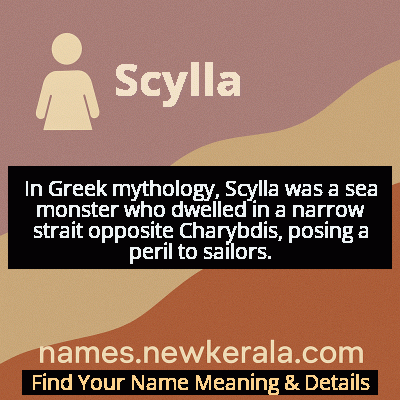Scylla Name Meaning & Details
Origin, Popularity, Numerology Analysis & Name Meaning of Scylla
Discover the origin, meaning, and cultural significance of the name SCYLLA. Delve into its historical roots and explore the lasting impact it has had on communities and traditions.
Name
Scylla
Gender
Female
Origin
Greek
Lucky Number
9
Meaning of the Name - Scylla
In Greek mythology, Scylla was a sea monster who dwelled in a narrow strait opposite Charybdis, posing a peril to sailors.
Scylla - Complete Numerology Analysis
Your Numerology Number
Based on Pythagorean Numerology System
Ruling Planet
Mars
Positive Nature
Generous, passionate, energetic, and humanitarian.
Negative Traits
Impulsive, impatient, moody, and can be overly emotional.
Lucky Colours
Red, maroon, scarlet.
Lucky Days
Tuesday.
Lucky Stones
Red coral, garnet.
Harmony Numbers
1, 2, 3, 6.
Best Suited Professions
Military, sports, philanthropy, leadership roles.
What People Like About You
Courage, energy, leadership, generosity.
Famous People Named Scylla
Scylla (Mythological)
Mythological Sea Monster
Created one of mythology's most famous navigational hazards in the Strait of Messina
Scylla in Homer's Odyssey
Literary Character
Central obstacle in Odysseus's journey, representing unavoidable danger and strategic choice
Scylla in Ovid's Metamorphoses
Literary Character
Featured in the transformation myth that explains her monstrous nature
Name Variations & International Equivalents
Click on blue names to explore their detailed meanings. Gray names with will be available soon.
Cultural & Historical Significance
The phrase 'between Scylla and Charybdis' has entered global consciousness as an idiom for being caught between two dangers. This concept has influenced philosophy, literature, and everyday decision-making for centuries. During the Renaissance, Scylla became a popular subject in art, often depicted as a beautiful woman from the waist up with monstrous lower parts featuring dog heads and serpent tails. In modern times, her story continues to resonate in psychology as a metaphor for impossible choices and in feminist reinterpretations as a symbol of female power distorted by patriarchal narratives.
Extended Personality Analysis
The name Scylla carries connotations of complex, multifaceted personalities marked by transformation and resilience. Individuals with this name are often perceived as having undergone significant personal evolution, emerging with strengthened character but perhaps carrying scars from their journey. They typically possess a commanding presence that can be both intimidating and fascinating to others. There's often a duality to their nature - capable of great depth and sensitivity while maintaining formidable defensive mechanisms. These individuals usually demonstrate remarkable adaptability in challenging situations, reflecting their namesake's ability to thrive in dangerous environments.
Their personality often includes strategic thinking and the ability to navigate complex dilemmas, embodying the wisdom of choosing between difficult options. While they may be perceived as intimidating or mysterious initially, those who earn their trust discover loyal, protective individuals with deep emotional reserves. The mythological background suggests someone who understands transformation intimately - whether through personal growth, overcoming adversity, or unexpected life changes. They tend to be independent, self-reliant, and unafraid of their own power, though they may struggle with being misunderstood by those who only see their 'monstrous' exterior rather than their complete story.
Modern Usage & Popularity
In contemporary naming practices, Scylla remains an extraordinarily rare choice, typically selected by parents deeply interested in mythology, literature, or seeking uniquely powerful names. Its usage is almost exclusively limited to English-speaking countries and appears primarily in artistic, academic, or maritime communities. According to available birth records, the name appears fewer than five times annually in the United States, placing it well outside the top 100,000 names. However, it enjoys greater visibility in popular culture through fantasy literature, video games, and film adaptations of mythological stories. Modern parents who choose this name often appreciate its strong phonetic qualities, rich mythological background, and the conversation-starting nature of such an unusual name. They typically acknowledge but don't fear the monstrous connotations, instead focusing on the name's representation of strength, transformation, and survival. The name's rarity ensures that any child named Scylla will have a truly distinctive identity, though they may need to frequently explain their name's origin and meaning.
Symbolic & Spiritual Meanings
Symbolically, Scylla represents the fundamental human experience of facing unavoidable danger and making impossible choices. Her position opposite Charybdis creates the ultimate metaphorical dilemma - the choice between two catastrophic outcomes where any decision involves significant loss. This has made her a enduring symbol in philosophy, psychology, and literature for navigating life's most difficult decisions. The transformation from beautiful nymph to monster symbolizes how trauma, jealousy, or external circumstances can fundamentally alter one's nature and how others perceive them. Her multiple heads represent the multifaceted nature of danger and the need for constant vigilance in complex situations.
In psychological terms, Scylla can represent the shadow self - the aspects of personality that society deems monstrous or unacceptable. Her story speaks to the human capacity for adaptation and survival in the face of profound change. The rocky coastal environment she inhabits symbolizes boundaries and thresholds - the dangerous spaces between safety and peril, known and unknown. Modern interpretations often view Scylla as a feminist symbol of female power that has been monstrousized by patriarchal narratives, representing how strong women are often characterized as dangerous or threatening when they defy expectations. Her enduring symbolic power lies in this complexity - she is both victim and monster, danger and landmark, representing the dualities that define much of human experience.

